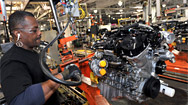Supply Chain
Our suppliers are critical allies in our success.
Working with suppliers
Collaborating to improve sustainability throughout our supply chain
-
Building Supplier Relationships
Strong relationships improve our ability to encourage and influence the sustainability goals and management processes of our suppliers.
-
Building Supplier Capability
We help our suppliers build the capability they need to manage sustainability issues internally and throughout their own supply chains.
-
Industry Collaboration
We are leading work with our counterparts in the automotive industry to develop common approaches to a full range of sustainability issues.
-
Diversity
In 2012, we purchased $5.7 billion in goods and services from approximately 400 minority- and women-owned suppliers.
Human rights
Working to expand human rights throughout our supply chain
-
Training
To date, we have trained 2,100 of our suppliers on human rights and environmental sustainability issues.
-
Assessing Suppliers
To date, we have conducted more than 800 third-party audits of Tier 1 suppliers on ethics and working conditions issues.
-
Our Code
The basis of our sustainability work with suppliers is the Ford Code of Human Rights, Basic Working Conditions and Corporate Responsibility.
Raw materials
Working to improve sustainability deep in our supply chain
-
Conflict Minerals
Ford is working to assess and eliminate the use of Conflict Minerals in our products and supply chain.
-
Forced Labor
We are engaging with our suppliers and industry to address the risks of forced labor and human trafficking in our supply chain.
Supplier environmental performance
Helping our suppliers improve their environmental performance
-
GHG Emissions Reporting
We are continuing to expand our understanding of suppliers’ greenhouse gas emissions.
-
Logistics
We are continuing to reduce the environmental impacts of transporting our parts and finished vehicles.
The automotive supply chain is one of the most complicated of any industry. Automakers like us rely on thousands of suppliers to provide the materials, parts and services necessary to make our final products. (See Supply Chain Profile.) Many suppliers serve numerous automakers, and each of those suppliers, in turn, has multiple suppliers. There are often six to 10 levels of suppliers between an automaker and the source of raw materials that eventually enter the manufacturing process. The breadth, depth and interconnectedness of the automotive supply chain make it challenging to effectively manage business and sustainability issues.
In today’s economic environment, achieving lower costs, improving quality and meeting sustainability goals require an unprecedented level of cooperation with suppliers, as well as strong supplier relationships. Ford and its suppliers must work jointly to deliver great products, have a strong business and make a better future.
This section describes our overall approach to developing a sustainable supply chain, including building strong relationships with our suppliers, developing supplier capability to manage sustainability issues, and collaborating with others in our industry on supply chain sustainability. It also describes our efforts to:
- Support human rights in our supply chain
- Promote environmental sustainability in our supply chain
- Address human rights and environmental issues related to certain raw materials
- Promote diversity among our suppliers
More than 80 percent of Ford’s strategic production suppliers have a robust code of conduct aligned with Ford’s Code.
Sustainable Raw Materials
We are leading industry-wide efforts to support supply chain sustainability and eliminate conflict minerals in our supply chain.
Assessing Supplier Emissions
In 2012, we expanded our supplier greenhouse gas emissions survey to 135 suppliers.












